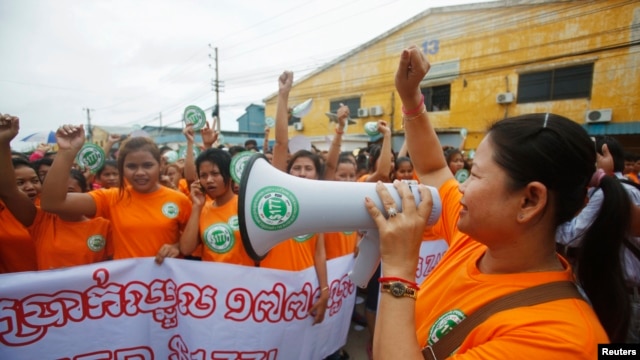Phorn Bopha
January 15, 2015
PHNOM PENH—In the wake of deadly crackdowns on protesting Cambodian garment workers a year ago, labor leaders say they have been forced to change tactics after small gains came at a high price.
The movement won a small victory in a wage dispute, earning a raise in the minimum wage from $100 to $128 per month.
But the raise has come with a cost
Buyers have proven reluctant to make orders, and factories continue to fire union members they see as troublemakers. Union leaders say this is forcing them to change the way they operate, away from demonstrations and towards appeals to buyers directly.
“This year [2014], we had more than 250 workers [get fired],” said May Sopheaktra, president of the Cambodian Alliance of Trade Unions. “In 2013 we only had about 30 to 40 people. People have been fired since they started asking for $166, then $177 [per month]."
Changing Tactics
At least five unions have actively pushed for an increase in the minimum wage, as the cost of living continues to rise, putting a squeeze on the estimated 600,000 workers currently employed in the sector. But many union workers have been fired, particularly in factories located in Phnom Penh and the provinces of Kampong Cham, Kandal and Svay Rieng.
Pao Sina, president of the Collective Union of Movement of Workers, said protests now risk the lives of workers. At least five people died in a government crackdown on demonstrations last January. “We don’t want to protest, since we don’t want a confrontation, and we don’t want buyers to be so nervous,” he said in an interview with VOA.
Aside from those dangers, union leaders tend to get fired, he said. “Sixty leaders were fired in 2014,” he said. Just two were fired in 2013. “They don’t cite the reasons for firing them. They use this language: ‘They are involved in rebellion.’”
Labor unrest has meanwhile meant a decline in buyers’ orders. Pao Sina said labor leaders are now trying to talk with them directly. Union leaders say they have spoken face to face or had written communications with major brands, like Puma, Adidas and others.
Protests have decreased, from 147 in 2013 to 108 in 2014, according to the Garment Manufacturers Association in Cambodia, or GMAC.
Pao Sina said this is a result of the crackdowns, as well as the courts, with the questioning and detention of labor leaders scaring other workers. “They are exhausted now,” he said.
Official Warnings
Six union leaders have been warned by the courts not to get involved in public gatherings, and no union meetings have taken place since the $128 wage went into effect, Jan. 1.
Chea Mony, president of the Free Trade Union, whose brother, Chea Vichea, also a labor organizer, was murdered in 2004, said union leaders continue to face mistreatment at factories, even if they are simply alerting bosses to poor conditions. “They look for, for example, whether the temperature is too high or there are not enough fans,” he said.
Yang Sophoan, president of the Cambodian Alliance of Trade Unions, said she still wants a better wage for workers and is willing to protest, but she can’t do it without support. “I want to protest, but it is impossible when I do it alone,” she said.
Tun Sophoan, coordinator for the International Labor Organization in Cambodia said they have worked to help unions operate within the legal system, but the lack of a labor court has made problem-solving difficult. “We have sent complaints on behalf of the unions to the [Ministry of Labor],” he said. Earlier this year, the ILO released a statement calling on global brands to help Cambodia absorb a wage increase.
“It is important that all sides work together to ensure Cambodia’s garment industry remains economically viable,” Maurzio Bussi, the ILO’s country director for Thailand, Cambodia and Laos, said in the statement. “We call on the global brands to play their part.”
Government officials, including Labor Ministry spokesman Heng Suor, could not be reached for comment on this story.
Foreign Buyers
Meanwhile, major brands say they will support the new $128 minimum wage and will continue to look to Cambodia as a major source of clothes and shoes.
US retailers said they had been watching the situation, and advocating negotiations that set a decent living wage.
Gap Inc. said it has been an active supporter of regular dialogue in Cambodia to address workers’ wage conditions and to ensure that garment workers are able to live healthy and productive lives.
“We are committed to doing business in Cambodia,” Laura Wilkinson, a Gap spokeswoman, said in an email. “We care about the women and men who make our clothes, and remain committed to helping to improve conditions for garment workers in the countries where we do business.”
The new minimum wage was a compromise set by the government, one that workers say will do little to improve their struggle to maintain a standard of living amid rising prices of goods and services. But factories had said they feared losing buyers if wages were increased too greatly.
The U.S. is a major buyer of Cambodian garments, shoes and textiles.
Kimseng Men contributed to this report, which was produced in collaboration with the VOA Khmer service.


No comments:
Post a Comment